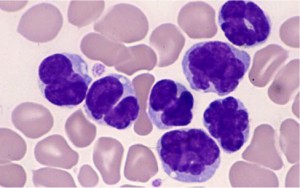A new clue for ATL research Cell-proliferation mechanism in adult T-cell leukemia explained

Carriers of the Human T-cell lymphotropic virus (HTLV), a form of human RNA retrovirus, are concentrated in Japan and parts of Southeast Asia, central Africa, the Caribbean, and parts of Latin America. They number approximately one million in Japan and 20 million in the world. Most will not suffer any illness, but about five percent will develop Adult T-cell leukemia (ATL).
The mechanism by which ATL cells proliferate is largely unknown, and there is no effective treatment for the disease. In Japan alone, some thousand individuals develop the disease each year and die within twelve months.
Professor Toshiki Watanabe and his group at the University of Tokyo’s Graduate School of Frontier Sciences have shown that the reduction of the micro RNA miR-31 is an important component in the development of ATL, and that the replacement of miR-31 leads to the death of cancerous cells.
The research group carried out a large-scale array analysis of the ATL genome and RNA transcripts and found that without exception, ATL cells showed a reduction in levels of miR-31 which is mainly mediated by the action of Polycomb proteins. The reduced miR-31 level results in the constant activation of the NF-κB pathway involved in cell proliferation through activation of the enzyme NIK. As a result, cells become cancerous.
This research should lead to the development of treatments not only for ATL but also understanding the mechanisms of cell function in other forms of cancers and in normal cells. Additionally, a database of the large-scale array analysis data has been prepared and the foundations laid for further research into ATL. This result is a major contribution to both clinical and fundamental medical research.
Department release/press release (Japanese)
Paper
Makoto Yamagishi, Kazumi Nakano, Ariko Miyake, Tadanori Yamochi, Yayoi Kagami, Akihisa Tsutsumi, Yuka Matsuda, Aiko Sato-Otsubo, Satsuki Muto, Atae Utsunomiya, Kazunari Yamaguchi, Kaoru Uchimaru, Seishi Ogawa, and Toshiki Watanabe,
“Polycomb-Mediated Loss of miR-31 Activates NIK-Dependent NF-κB Pathway in Adult T Cell Leukemia and Other Cancers”,
Cancer Cell 21, 121?135, January 17, 2012. doi:10.1016/j.ccr.2011.12.015
Article link








